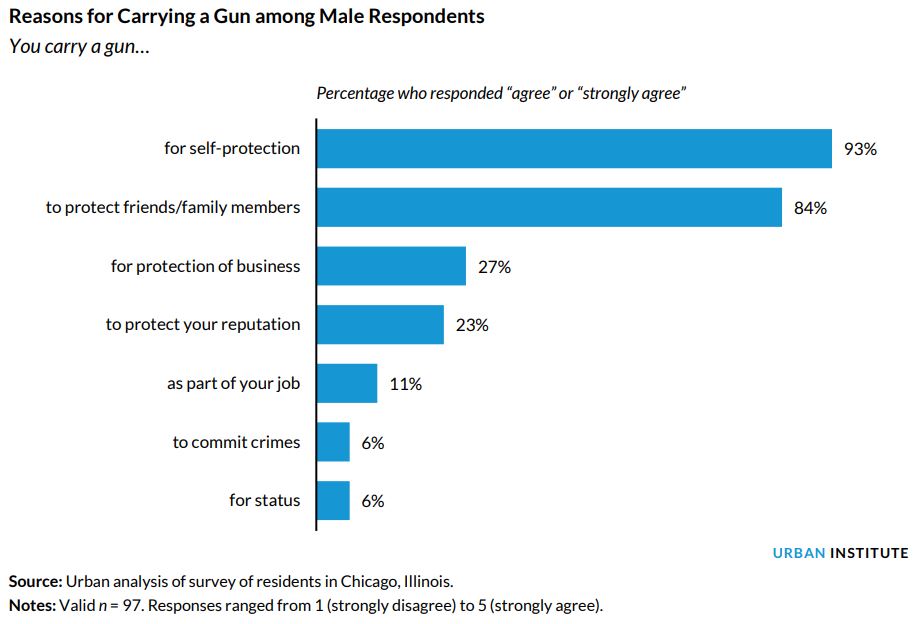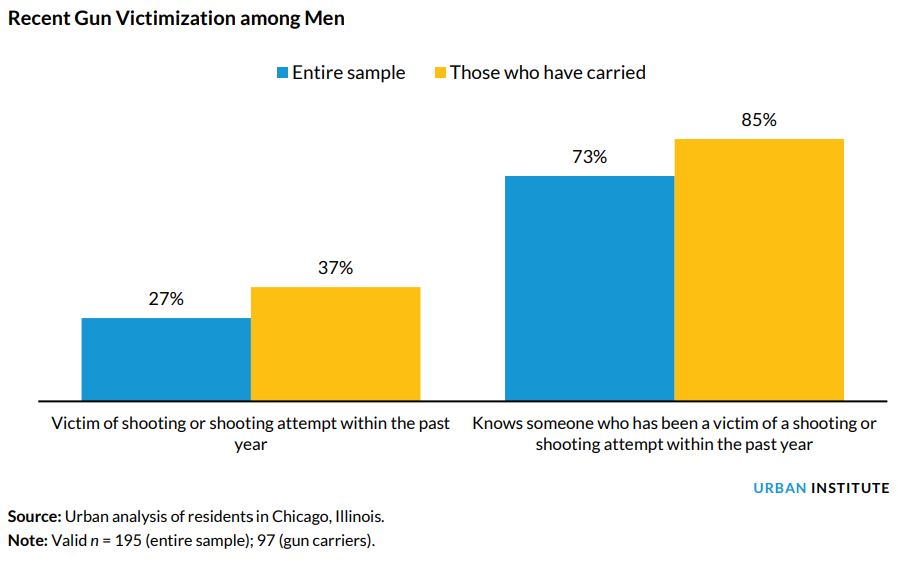
In 2017, Chicago experienced more homicides than New York City and Los Angeles combined, and many of these deaths came at the hands of gun violence. Chicago had 3,475 shooting victims in 2017. While violence affects everyone in these communities, Chicago’s youth are often both the victims and the perpetrators of gun violence.
New research by the Urban Institute sought to learn more about young adults in Chicago neighborhoods experiencing high rates of gun violence: whether they currently or have carried firearms and why and what they view as the best strategies to reduce gun violence and promote safe communities.
Urban's researchers interviewed 345 young adults in four neighborhoods: Austin, Auburn-Gresham, Englewood, and North Lawndale in November 2017 and February 2018. Here’s what they found.
1. Many young men have carried guns but not routinely.
Of the 345 young adults interviewed, one in three said they had carried a gun—almost all illegally. Of the 98 men who reported ever having carried a gun, only 7 percent said they did so always, 16 percent said they carried often, 32 percent said they carried sometimes, and 45 percent said they rarely carried.
2. Men carry for protection.
Men cited safety concerns, for their families and friends, as their top reason for carrying a gun. Nearly all the men who self-reported having carried said they did so to protect themselves (93 percent). Six percent said they carried to commit crimes.

3. Victimization is a common experience.
One of the most compelling findings is the common experience of victimization. Of those surveyed, 52 percent reported having been victimized in the past year. Among those who have carried a gun, nearly 40 percent had been shot or shot at recently. Men who had been shot or shot at in the past year were 300 percent more likely to report they had carried a gun.

4. Guns are accessible through informal channels.
The young adults reported that getting a gun is not difficult. In fact, 69 percent said guns can be acquired within hours. A vast majority indicated that young people are likely to obtain guns through street dealers (86 percent), to borrow or buy guns from friends of family (78 percent), or to steal them (76 percent).
5. Perceived risk of apprehension is low.
Only a small percentage indicated that getting caught carrying or selling a gun or shooting at someone is likely or very likely, and those shares were even smaller among the subset of those who reported ever having carried a gun.
Notably, the entire sample perceive the risk of apprehension for shooting at someone to be lower than the risk of apprehension for carrying a gun.
6. Perceptions of police are poor.
Perceptions of low risk of apprehension are mirrored by low opinions of the police. Young adults’ views of police in their neighborhood are poor across the entire sample but notably worse among young adults who reported ever carrying a gun.
Additionally, 71 percent said that police often stop them for no good reason, and 95 percent of people who have carried reported that they have been stopped by police for no good reason.
Guns in Chicago: A “vicious cycle”
These survey findings suggest that a vicious cycle is occurring in Chicago: many young people who have personal and vicarious victimization experiences do not trust the police to keep their neighborhoods safe, believe they need to carry guns to protect themselves and their friends and family, and perceive the risk for getting caught for carrying or shooting as low.
The cycle can be stopped. Community partners we worked with underscored the need for police and community-based service providers to be mindful of residents’ frequent exposure to victimization and the need for trauma-informed care. Data collected through the survey cannot determine whether gun carrying leads to victimization or vice versa, but victimization among young adults demands focused attention.
Tune in and subscribe today.
The Urban Institute podcast, Evidence in Action, inspires changemakers to lead with evidence and act with equity. Cohosted by Urban President Sarah Rosen Wartell and Executive Vice President Kimberlyn Leary, every episode features in-depth discussions with experts and leaders on topics ranging from how to advance equity, to designing innovative solutions that achieve community impact, to what it means to practice evidence-based leadership.